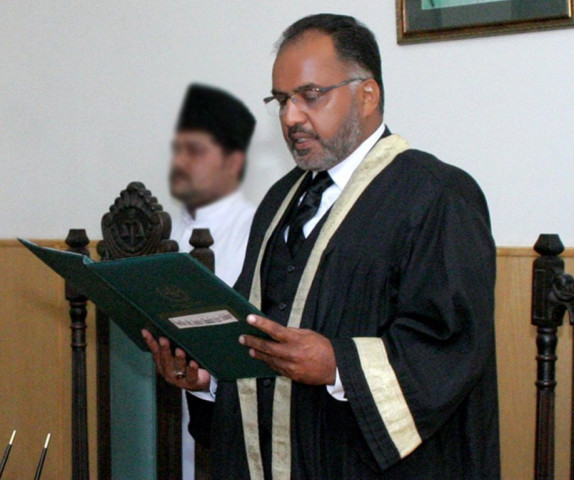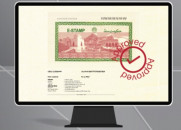SJC action: IHC judge disputes ‘vague’ show-cause notice
Seeks open trial; calls complainants including MNA Dasti ‘proxies’

Islamabad High Court (IHC) Justice Shaukat Aziz Siddiqui. PHOTO: MUHAMMAD JAVAID / EXPRESS
The IHC judge, in his reply over alleged misconduct for questioning the role of the army in last year’s Faizabad sit-in, has also said that for a senior army official, signing an agreement or distribution of money among demonstrators cannot be termed his constitutional duty.
The SJC, headed by Chief Justice of Pakistan Mian Saqib Nisar, had issued another show-cause notice to Justice Siddiqui for questioning the role of the ‘constitutional institution’ in the matter related to the Faizabad sit-in last year. In response to the notice, the IHC judge submitted his reply in the SJC on Monday.
IHC moved to make report public on who used COAS' name in 'Faizabad agreement'
“This show-cause notice (SCN) is unprecedented. It is void in its very inception. Besides, it is also confusing, ambiguous, vague and evasive. It does not contain any specific allegation or any particular remarks or observations made about any specific institution. In my humble understanding all institutions including armed forces are creatures of the Constitution and, therefore, cannot be deemed to go beyond the reach of the Constitutional Courts”, says the reply.
The reply states that as per Article 243 of the Constitution, the federal government has control and command of the armed forces and not the other way around. Article 243 of the Constitution requires the armed forces to act under the directions of the federal government to defend Pakistan against external aggression or threat of war and, subject to law, act in aid of civil power when called upon to do so, it adds.
“As far as the active participation of some senior officials of a ‘sensitive institution’ is concerned, it is submitted that, in such negotiations, caution could have been observed. Discretion is the better part of the valour. Acts like the signing of the agreement or distribution of money among the demonstrators by a senior official cannot be termed constitutional duty of such official. In fact, due to such unwarranted acts of few individuals, respect for the entire institution, which is a part of the executive, has suffered,” says the reply.
Justice Siddiqui states that his loyalty to Pakistan is unquestionable and he has always kept the national interest supreme while performing his functions and rendering his judgments.
“It is, however, a sad reality that different operators have always made me victim through different devices. I submit it with all humbleness that my conscience is clear and my hands are clean. I have committed no wrong whatsoever, and remarks or observations made during the course of hearing do not constitute misconduct. However, if someone has any objections to many observations recorded in any order or judgment passed on judicial side, same can be impugned in appeal and the Supreme Court can expunge any remark or observation in accordance with the judicial norms and practices.”
The IHC judge also states that it is a matter of record that, the leadership of sit-in directed abusive, derogatory and filthy language at the superior courts, judges of the Supreme Court, and the chief justice of Pakistan.
“How could such remarks go unnoticed by any judge, as it was against the dignity, honour and prestige of the judiciary as an institution. It is an admitted fact that life in twin cities was paralysed by the participants of sit-in and life of the citizens was reduced to a miserable state, which obviously was a serious infringement of their fundamental rights. It looked evident that ICT Administration was rendered ineffective,” says the reply.
The judge states, “In my understanding, the disputed agreement cannot be described as an administrative arrangement. It was rather an unconstitutional document reduced into writing under circumstances not conducive to the Constitutional framework and the rule of law. Since no details of any remarks or observations alleged against me, if any, as judge of Islamabad High Court have been mentioned in the show-cause notice, therefore, I am not in a position to give any specific reply or advance any explanation.”
According to the IHC judge, the organic law of the country – the Constitution – renounces secrecy and in-camera trials, which by its nature, cannot be fair and transparent. “It is, therefore, prayed that proceedings in the instant matter be kindly conducted in open court.”
Judges misconduct: SJC decides recording evidences
Describing the complainants, MNA Jamshed Dasti and Advocate Kulsoom Khaliq, as ‘only proxies’, Justice Siddiqui says, “In fact, these complaints have been brought at the behest of somebody else. I have un-rebutted evidence to this effect, which I shall produce if need be during the course of evidence.”
The reply says that oath of office of a judge of the constitutional court demands that judge must ensure that organic pillars – legislature, executive and judiciary – perform the functions in accordance with the scheme of the Constitution and no deviation be allowed by any of the departments or institutions under these constitutional organs.
The judge adds that he always performed his duties in accordance with the oath of office, Code of Conduct, the Constitution, the law, and his conscience. “Since the oath binds us that no order or judgment be passed due to fear or favour, therefore, I have always kept this principle utmost in my mind.”
Meanwhile, a five-judge larger bench, headed by Justice Azmat Saeed Sheikh, has been constituted to hear the IHC judge’s petition seeking an open trial today (Tuesday). The SJC will hear his case immediately afterwards.



















COMMENTS
Comments are moderated and generally will be posted if they are on-topic and not abusive.
For more information, please see our Comments FAQ